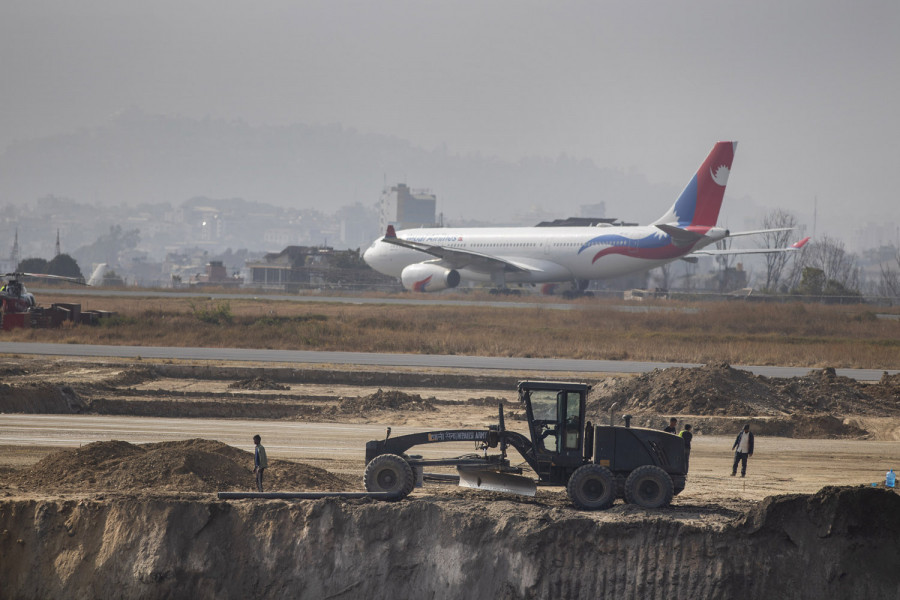National
Europeans not impressed by Nepal's efforts to improve aviation safety yet
Breaking up the civil aviation authority is a prerequisite to getting the country removed from the EU Air blacklist.
Sangam Prasain
While the European Union applauded the Nepal government’s firm commitment to improving its air safety mechanism, the lawmaking body—the European Commission—has questioned the issuance of air operator certificates to new Nepali carriers without sufficient compliance with international safety standards.
The ban on airlines from Nepal from flying to Europe for their failure to adhere to safety standards has entered its eighth year.
On December 7, coinciding with International Civil Aviation Day, the EU said that the Commission was aware of the efforts made by Nepal, notably with regard to a new aviation bill before Parliament.
“It would be key for this legislation to be adopted by Parliament and subsequently implemented,” said the Delegation of the European Union to Nepal in a statement. “This would allow the Commission to advance with the process of eventually removing Nepal from the EU Air Safety List.”
Based on this announcement, Tourism Minister Yogesh Bhattarai was quick to say that Nepali carriers will soon be removed from the EU Air Safety List as there has been progress in splitting the Civil Aviation Authority of Nepal into two entities–regulator and service provider.
Nepal has yet to fulfil its commitment to breaking up the civil aviation body, a prerequisite to getting the country removed from the EU Air Safety List.
On June 2, the Commission had questioned the ability of Nepal’s aviation regulatory body to enforce sufficient safety compliance.
It requested the Civil Aviation Authority of Nepal on April 22 to provide a list of all air operator certificate holders certified in Nepal as part of its continuous monitoring activities.
On May 3, the civil aviation regulator informed the Commission that the air operator certificate of Air Kasthamandap had been revoked, and that new carriers Heli Everest and Kailash Helicopter Services had been certified.
“They also reported that Muktinath Airlines had changed its name to Prabhu Helicopters,” according to the EU's official journal.
“Since the Civil Aviation Authority of Nepal has not demonstrated a sufficient ability to implement and enforce the relevant safety standards, the issuance of air operator certificates to those new air carriers does not guarantee sufficient compliance with international safety standards,” the journal stated.
“In accordance with the common criteria set out in the Annex to Regulation (EC) No 2111/2005, the Commission, therefore, considers that with respect to air carriers from Nepal the list of air carriers which are subject to an operating ban within the Union should be amended to include Heli Everest and Kailash Helicopter Services in Annex A to Regulation (EC) No 474/2006 and to remove Air Kasthamandap from that Annex.”
At least two sources at the Civil Aviation Authority of Nepal said they were unaware of the developments.
The European Commission has continued its ban on Nepali airlines for eight consecutive years through an updated EU Air Safety List published on December 2.
On December 5, 2013, the Commission had imposed a blanket ban on all airlines from Nepal from flying into the EU.
Raj Kumar Chettri, spokesperson for the Civil Aviation Authority of Nepal, said they were not aware of the June report, but that there had been significant progress on the safety front. “We are confident of being removed from the air safety list within a few months,” he said.
The European Commission had asked that Nepal’s civil aviation body be fragmented with a clear demarcation of its powers and responsibilities because its dual functions gave rise to a conflict of interest.
The Civil Aviation Authority of Nepal Bill and the Air Service Authority of Nepal Bill, proposing to separate the aviation body, were at the final stages of being passed by the National Assembly during the budget session of the federal parliament that ended on July 2.
The bills had already been okayed by the Legislation Management Committee of the Assembly. But the government’s abrupt decision to prorogue Parliament, which was largely guided by internal problems in the ruling Nepal Communist Party (NCP), left the two bills in limbo.
Officials at the civil aviation body said that the Legislation Management Committee of the upper house had already passed the bills, so it will not take much time to register them at the lower house for deliberation and approval. The two pieces of legislation will become law after they are signed by the President.
The government has been working on the proposed legislation for the last 10 years, but it was plagued by bureaucracy at every step.
Following pressure from a number of global aviation watchdog groups, the Cabinet had given the go-ahead to the Tourism Ministry in July last year to draft two separate bills to split up the Civil Aviation Authority.
“We are hopeful that Parliament's winter session will begin this month, and that the bills will be passed by both houses,” said Chettri, the spokesperson. “We expect it will take at least 60 days for the two pieces of legislation to be approved.”




 20.12°C Kathmandu
20.12°C Kathmandu















